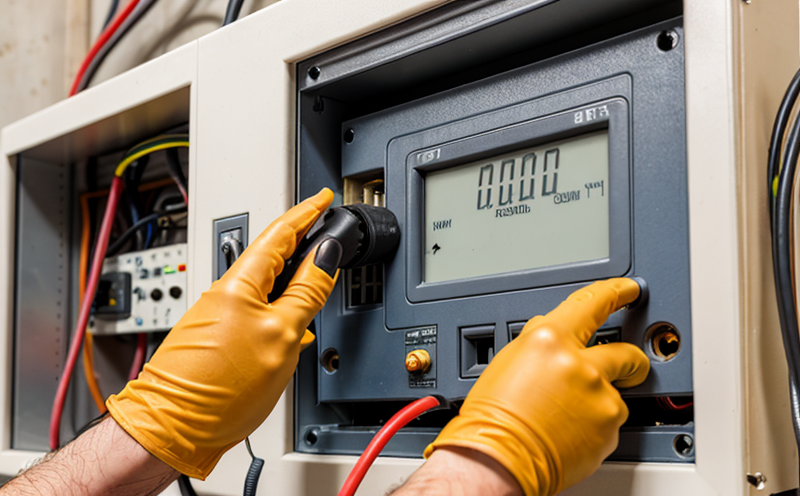SAE J2929 Electrical Functional Testing of Lithium-Ion Battery Systems
The SAE J2929 standard provides a comprehensive framework for electrical functional testing of lithium-ion battery systems. This service ensures that the safety, performance, and reliability of these critical components meet stringent industry standards before they are deployed in automotive applications. Lithium-ion batteries are integral to electric vehicles (EVs), hybrids, and energy storage solutions, making their robustness a paramount concern.
The SAE J2929 standard is widely recognized for its detailed protocol that encompasses various tests such as insulation resistance testing, connector durability checks, and thermal cycling. Compliance with this standard is essential for manufacturers looking to ensure product quality, reduce the risk of field failures, and meet regulatory requirements in multiple jurisdictions.
The test procedure outlined in SAE J2929 involves several critical steps aimed at simulating real-world conditions. Initially, batteries undergo a series of electrical tests to assess their insulation resistance. This step is crucial as it helps identify any potential short circuits that could lead to safety hazards. Following this, the connectors are subjected to durability checks to ensure they can withstand repeated charge-discharge cycles without failure.
Thermal cycling forms another key part of the testing process. This simulates the thermal stress experienced by batteries during operation in various environmental conditions. By subjecting the battery to a controlled temperature range, we can evaluate its performance under extreme cold and heat scenarios. This not only enhances safety but also ensures that the battery maintains its capacity over time.
The SAE J2929 standard places significant emphasis on real-world applicability. For instance, it requires testing under simulated operational conditions to ensure that the battery behaves as expected in different driving modes. This includes acceleration tests to mimic rapid changes in power demand and braking scenarios where energy is recovered. The testing protocol also covers high-rate discharge tests which are critical for assessing how quickly a battery can deliver its stored energy.
Quality managers, compliance officers, R&D engineers, and procurement teams play a pivotal role in ensuring adherence to SAE J2929 standards. By leveraging this service, they can gain confidence that the batteries meet all necessary requirements for safety, performance, and reliability. This is particularly important given the increasing demand for electric vehicles and the need to minimize environmental impact.
Adherence to SAE J2929 not only enhances the quality of lithium-ion battery systems but also supports broader industry goals such as sustainability and regulatory compliance. By rigorously testing these batteries, we contribute to a more reliable and safer automotive ecosystem.
| Application Area | Description |
|---|---|
| Automotive Industry | Ensuring the reliability of battery systems in electric vehicles and hybrids. |
| Energy Storage Solutions | Testing batteries for use in large-scale energy storage facilities. |
| R&D Laboratories | Evaluating new battery designs and technologies before commercialization. |
| Use Case | Application Example |
|---|---|
| Battery Insulation Resistance Testing | Testing a battery pack from an electric vehicle to ensure no internal short circuits. |
| Connector Durability Checks | Simulating 1,000 charge-discharge cycles on a prototype battery connector. |
| Thermal Cycling Simulations | Evaluating the performance of a lithium-ion battery at temperatures ranging from -40°C to +60°C. |
Quality and Reliability Assurance
The SAE J2929 standard is not just about testing; it also emphasizes the importance of quality assurance throughout the entire process. By adhering to this standard, manufacturers can ensure that their lithium-ion batteries meet strict safety and performance criteria. This involves meticulous attention to detail in specimen preparation, rigorous adherence to test protocols, and thorough documentation.
One of the key aspects of quality assurance is ensuring that all testing equipment used conforms to international standards such as ISO 6469-1:2018 for insulation resistance testers or ASTM D5753-18 for connector durability tests. This ensures consistency and reliability in test results.
The documentation generated during the testing process plays a crucial role in quality assurance. Detailed records of each test, including parameters used, results obtained, and any anomalies noted, are essential for traceability. These documents serve as a valuable resource for troubleshooting issues and improving future products.
Reliability assurance is another critical component of this service. By consistently meeting the stringent requirements set by SAE J2929, we ensure that batteries perform reliably under various conditions throughout their lifecycle. This includes assessing how well the battery holds its charge over time (aging studies) and how it responds to repeated use cycles.
Quality managers can leverage this service to identify potential weaknesses in battery designs early on, allowing for corrective actions before mass production begins. Compliance officers benefit from knowing that they are meeting all relevant regulatory requirements, thereby reducing the risk of non-compliance penalties. R&D engineers gain valuable insights into how different factors affect battery performance, enabling them to innovate and improve future generations of products.
In summary, SAE J2929 electrical functional testing is a vital step in ensuring the quality and reliability of lithium-ion batteries. By following this standard, manufacturers can produce safe, efficient, and reliable battery systems that meet both current and future needs.





